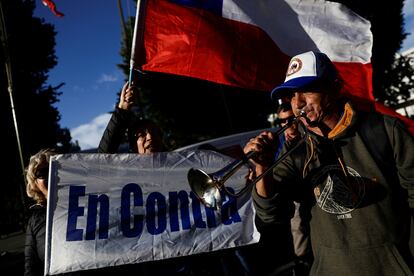Chile rejects conservative constitution, with 55% voting against it
With 99% of the vote counted, the ‘no’ option has won by a margin of 10 percentage points. The country’s current charter was written in 1980, although it has undergone 70 reforms


Chile has rejected the proposal for a new constitution drafted by a right-leaning Constitutional Council. With 99% counted, 55% voted “no” to the new charter on Sunday, with about 44% in favor. Turnout was 83%. The result was predicted by polls released 15 days ago, before the ban on new voter intention surveys. But it was an open race, in part because voting in Chile is mandatory, meaning there are new voters who could sway the outcome. Polls had also indicated that support for the proposed constitution was rising.
The result brings to a close a four-year process to draft a new charter. In other words, Chile is back where it was in November 2019, when politicians offered society the chance to change the Chilean Constitution as a way to calm the unrest that had swept across the country. Sunday’s result means that Chile will keep its current Constitution, which was drafted in 1980 under the dictatorship of Augusto Pinochet. Since Chile’s transition to democracy, it has undergone 70 reforms.
This is the second time that Chile has rejected a proposal for a new constitution. In 2022, 62% of voters rejected a charter that was drafted by a left-leaning convention. This year, the document was written by a convention that was dominated by right-wing commission members, including members of the far-right Republican Party. The left in Chile rejected the charter, even though it means keeping a Constitution that dates back to the dictatorship. When voting Sunday morning, former president Michelle Bachelet, from the Socialist Party, said that the left had to resign themselves to choosing “between something bad and something terrible.”
But Sunday’s outcome is not a victory for the left-wing government of Gabriel Boric, which campaigned against the new charter. The “no” vote was also backed by sectors of the center-left that are not in government, as well as groups that are even more far-right than the Republican Party. It has, however, been met with relief by the government: if the new charter had succeeded, it would have been a disaster for the Boric administration.
The focus now is on the right-wing commission members, in particular José Antonio Kast, from the Republican Party. Kast presided the convention behind the failed charter, even though his party never wanted to change the current Constitution. With Sunday’s defeat — by a margin of 10 percentage points — the traditional right-wing is likely to try to take back ground from the far right. “We recognize defeat with clarity and humility,” Kast said on Sunday night.
The left was opposed to the new charter, arguing that it deepened the neoliberal principles of the current Constitution and jeopardized women’s rights. “This proposal puts Chile’s progress in women’s equality and non-discrimination at risk,” said lawyer Macarena Sáez, executive director of the women’s rights division of Human Rights Watch (HRW).
The draft charter was not very different from the current Constitution, but it did include a key issue: it proposed that basic goods in health, education and pensions be financed with general revenue. It, however, allowed for both a state and private system to operate.
The constituent process began with the agreements of November 2019, when the political class offered citizens a route to change the Constitution. But now it’s not clear that the country’s problems stem from the Constitution. Some, including sociologist Eugenio Tironi, questioned whether it would have been better to undertake a more modest plan of socioeconomic reforms instead of trying to change the Constitution. The social unrest of 2019 not only threatened the conservative government of Sebastián Piñera, but also the country’s very democracy, with mass protests met with unprecedented levels of violence.
End of the road
Sunday’s vote has brought an end to Chile’s efforts to change the Constitution. “Whatever the result, the constituent process ends here,” said Camila Vallejo, the spokesperson for Gabriel Boric’s government. A similar thought was expressed by Evelyn Matthei, the right-wing mayor of Providencia, which is one of the most affluent communes in Santiago de Chile. “The only thing I hope is that we finally close this stage,” said Matthei, who is set to run in the 2025 presidential elections. She will face strong competition from the far-right leader José Antonio Kast, who won the first round against Boric in 2021.
In Chile, voters have become tired of the constituent process, with the second vote marked by indifference. While there was high turnout, this is largely due to the fact that mandatory voting was reinstated last year. Chileans are more concerned about other issues that cannot be fixed with a new constitution.
The country is in the grips of a security crisis. Chile’s homicide rate per 100,000 inhabitants rose from 4.5 to 6.7 in five years. If 845 murders were committed in 2018, that number reached 1,322 in 2022, according to official data. The fear of being a victim of crime has reached an all-time high, according to the Citizen Peace Foundation. The economy has remained stagnant for more than a decade; the public education crisis, which started to become evident during the 2016 protests, persists; while the private health system faces serious problems that could take a heavy toll on the public system. “Regardless of the result of the plebiscite, we are going to work for the people’s priorities,” said Boric on Sunday. His government has two more years in office, until March 2026.
Like every plebiscite, this one also polarized the country, as seen by the divisions among Chile’s former presidents. While Bachelet and Ricardo Lagos were against, Eduardo Frei Ruiz-Tagle (1994-2000) and Piñera (2010-2014 and 2018-2022), voted in favor. “I hope that we take advantage of this opportunity to approve a Constitution in democracy,” said Piñera.
Alfredo Sepúlveda, writer and academic at the Diego Portales University (UDP), thinks that the constituent process has been “a clear failure, no matter how you look at it.” He argued that neither the current Constitution nor the proposed charter represented “a real, broad and consensual social pact, which is what was sought from the beginning and the only thing that made any sense.”
Sign up for our weekly newsletter to get more English-language news coverage from EL PAÍS USA Edition
Tu suscripción se está usando en otro dispositivo
¿Quieres añadir otro usuario a tu suscripción?
Si continúas leyendo en este dispositivo, no se podrá leer en el otro.
FlechaTu suscripción se está usando en otro dispositivo y solo puedes acceder a EL PAÍS desde un dispositivo a la vez.
Si quieres compartir tu cuenta, cambia tu suscripción a la modalidad Premium, así podrás añadir otro usuario. Cada uno accederá con su propia cuenta de email, lo que os permitirá personalizar vuestra experiencia en EL PAÍS.
¿Tienes una suscripción de empresa? Accede aquí para contratar más cuentas.
En el caso de no saber quién está usando tu cuenta, te recomendamos cambiar tu contraseña aquí.
Si decides continuar compartiendo tu cuenta, este mensaje se mostrará en tu dispositivo y en el de la otra persona que está usando tu cuenta de forma indefinida, afectando a tu experiencia de lectura. Puedes consultar aquí los términos y condiciones de la suscripción digital.








































